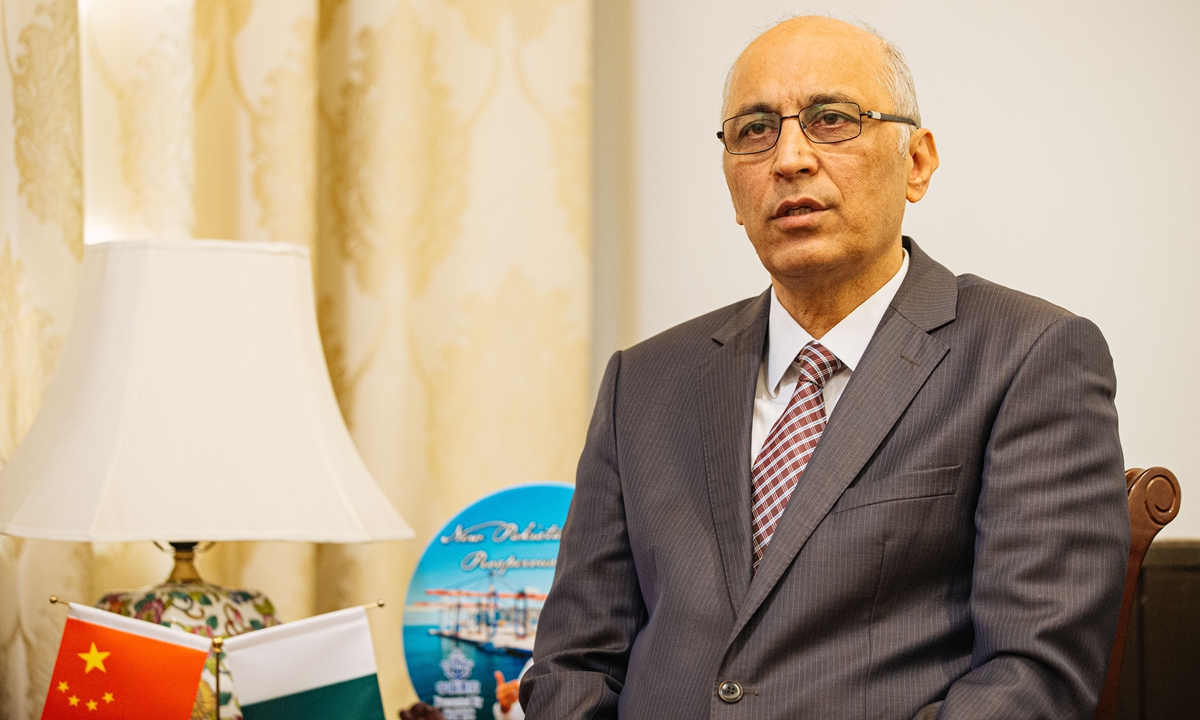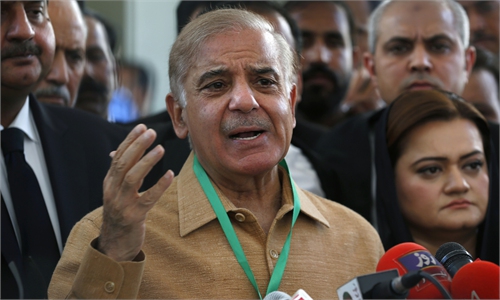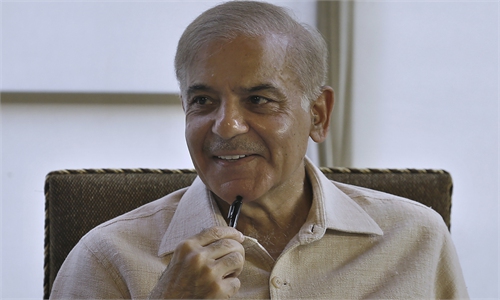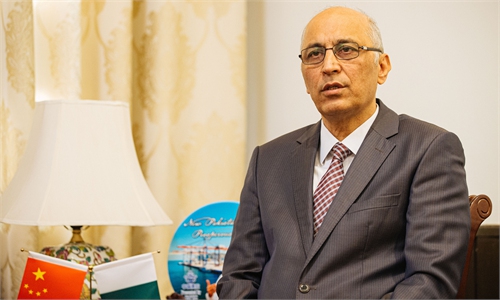IN-DEPTH / DIPLOMATIC CHANNEL
Exclusive full interview with Pakistani ambassador: China-Pakistan ties are significant regardless of leadership change

Pakistani Ambassador to China Moin ul Haque. Photo: Courtesy of the Embassy of Pakistan in Beijing
Editor's Note:
As "Iron brothers," China and Pakistan have remained in close and supportive friendship since they formally established diplomatic relations in 1951. On April 11, Pakistan's parliament elected Shahbaz Sharif as the country's new Prime Minister. The Chinese Foreign Ministry sent congratulations to Sharif on his election and stressed that China and Pakistan are "all-weather strategic cooperative partners" with a "rock-solid and unbreakable" relationship. Sharif praised Pakistan's close relations with China and reaffirmed his resolve to elevate bilateral ties to a new level. In an exclusive interview with Global Times (GT) reporter Sun Haoran, Pakistani Ambassador to China Moin ul Haque (Haque) said that, as an old friend of China, Prime Minister Sharif looks forward to strengthening cooperation with China.
GT: Mr. Shahbaz Sharif has been elected as Pakistan's new Prime Minister. Will you please give us an introduction about him?
Haque: Mr. Shahbaz Sharif is the 23rd Prime Minister of Pakistan. He is a seasoned politician from Punjab province and also the younger brother of Mr. Nawaz Sharif, Pakistan's former Prime Minister.
In a rich political career spanning over three decades, Prime Minister Shahbaz remained the member of the provincial legislature of Punjab intermittently since 1988 subsequently serving thrice as the Chief Minister of the province. He also was the Leader of the Opposition in National Assembly of Pakistan since 2018.
During his tenure as the Chief Minister of Punjab, Mr. Shahbaz was praised for his focus on fast-pace socioeconomic development and successfully executing power generation, road and transportation, and health and social mega projects.
GT: China and Pakistan are "Iron Brothers." After taking oath, the new Prime Minister said that China is Pakistan's best friend. What is his vision for deepening Pakistan-China future ties?
Haque: The iron-clad friendship between China and Pakistan has been tested and is timeless. There is a complete national consensus in Pakistan on the significance of this relationship regardless of the change in government or leadership.
Prime Minister Shahbaz Sharif is an old friend of China. As Pakistan's leading politician, he has made valuable services to strengthening Pakistan-China friendship.
He is fond of China's rapid development and economic progress and has worked closely with the Chinese government in the past on the completion of many CPEC projects.
In his first speech after assuming office, Prime Minister Shahbaz expressed his goodwill for China and reaffirmed his resolve to elevate these historic ties to a new pedestal of cooperation and fast-track CPEC projects.
GT: Which CPEC projects would the new government prioritize?
Haque: Prime Minister Shahbaz Sharif is well known for his strong commitment to timely completion of CPEC projects. In his last term as Chief Minister of Punjab, he not only provided political support but also closely monitored and accelerated the implementation of all infrastructure and energy projects in Punjab.
Besides completion of important projects of Phase-I, including the Main Line-I and key energy plants, the early operation of the Special Economic Zones, to further stimulate our industrial output and high-quality development through enhanced cooperation in information communication technology (ICT), science and technology, and agriculture, will remain the priority of the government.
We will also continue to make rapid progress on the development of the Gwadar Port and Free Trade Zone to promote regional connectivity and economic integration.
GT: Pakistan has traditionally enjoyed good ties with the US. Given the emerging geopolitical scenario, how would Pakistan maintain good relations with the US while continue to strengthen its all-weather strategic cooperative partnership with China?
Haque: It is the cardinal principle of the foreign policy of Pakistan to develop friendly ties with all countries in the world and make concerted efforts for global peace and stability. As a policy, Pakistan does not subscribe to bloc politics. We seek international relations and initiatives that promote peace, development and security through constructive engagement and cooperation.
Pakistan regards the US as an important country with whom we enjoy strong ties in diverse fields of cooperation. We want to maintain this relationship on the principles of equality and shared benefits.
As a neighbor, all-weather strategic cooperative partner and trusted friend, Pakistan attaches great importance to its special friendship with China which is the cornerstone of our foreign policy. Over last seven decades of friendship, Pakistan and China have stood together despite changes in the international political landscape, and extended utmost support to each other on issues of mutual concerns.
It is a matter of immense satisfaction that our mutually beneficial ties have now expanded to new areas of cooperation, including trade and economy, people-to-people exchanges, cultural cooperation, and science and technology cooperation. It has added a new depth and dimension to our friendship and also set the foundations for our future engagements.
As the world finds itself at the threshold of a new era, our two countries are committed to further deepening our friendship and safeguard our common interests for prosperity and progress of our peoples and the peace and stability in our region.
GT: Pakistan is facing economic challenges for several reasons. How would the new Prime Minister tackle these issues? How can cooperation between China and Pakistan help in this regard?
Haque: For the last two years, the entire world has been facing serious economic difficulties due to the COVID-19 pandemic. The recent outbreak of hostilities between Russia and Ukraine has further accentuated economic problems, especially of developing countries, with disruption of supply chains and soaring commodity prices. Pakistan too has been hit hard and facing economic and financial squeeze.
In his maiden speech in the National Assembly, the Prime Minister spoke at length on the economic challenges faced by Pakistan and announced some relief measures to revive the economy. Soon after taking oath, he held a meeting with notable economists and experts to exchange views on economy, development and trade.
As Pakistan's largest trade partner and a major source of foreign direct investment (FDI), China occupies a pivotal position for Pakistan's economic revival and long-term development agenda. We are hopeful that investment by Chinese state-owned enterprises (SOEs) and private enterprises will be conducive for Pakistan's economic growth and create job opportunities. As a leading agrarian country, Pakistan looks forward to expanding the export of its agro and food products to China.
GT: Pakistan has made immense sacrifices to defeat the menace of terrorism and extremism. These efforts have been acknowledged by the international community, including China. How can Pakistan protect itself from terrorism and prevent any threats to CPEC?
Haque: You have rightly pointed to the sacrifices made by Pakistan in fighting and defeating terrorism. Pakistan's sacrifices, both in terms of human loss and economic costs, are unparalleled. We greatly value the Chinese acknowledgement of Pakistan's efforts in confronting this menace and for peace and security of our region.
Pakistan is mindful of the threats to its security and development projects like CPEC. Our valiant law enforcement agencies and armed forces remain vigilant to counter all nefarious designs of our adversaries against CPEC. Pakistan has put in place an elaborate security mechanism to ensure safety and security of all CPEC projects and personnel. I am confident that both Pakistan and China, through their coordination, will thwart all attempts that go against our friendship and disrupt CPEC cooperation between our two sides.
GT: How do you see Pakistan-China cooperation for economic development of Afghanistan?
Haque: We consider that a peaceful, prosperous and stable Afghanistan is vital to the shared development of our region. Pakistan stands ready to cooperate with China in this endeavor and we can jointly assist Kabul in achieving these objectives.
I would particularly like to mention the recent Meeting of Foreign Ministers of Neighboring Countries of Afghanistan in Tunxi where they finalized the Tunxi Initiative which lays out a framework for economic development and reconstruction of Afghanistan.
The Tunxi Initiative is an important step which highlights efforts made by the neighboring countries in humanitarian assistance, connectivity, economic reconstruction, agriculture and social investment.
Pakistan, China and Afghanistan have also shown interest on the extension of CPEC to Afghanistan. This would pave the way for Afghanistan's infrastructure development and its connectivity and integration with the region.



